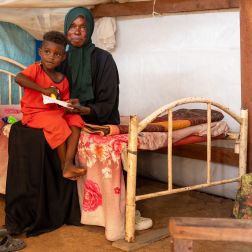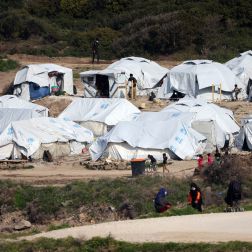- 7 mins read time
- Published: 1st December 2019
Looking back: Forced to flee Boko Haram and facing hunger
By 2016, thousands of people had died due to hunger and malnutrition and experts said that more than 65,000 people were officially classified as suffering from famine in a desperate and largely unknown humanitarian crisis in the Lake Chad Basin region of West Africa, one of the poorest places on earth.
Those that experienced the most extreme form of hunger were in pockets of northeast Nigeria, mainly in Borno state, which was only accessible to humanitarian agencies following protracted military action to secure areas formerly under the control of Boko Haram. They were part of a humanitarian crisis largely ignored by the international community, which also affected people in Niger, Chad and Cameroon.

Oxfam provided life-saving support in Nigeria, Niger and Chad to people who were forced to flee their homes as well as the already impoverished communities in which they were taking shelter. We provided people with desperately needed food as well as clean drinking water and sanitation to protect their health and prevent the spread of disease. And we also called on donors and governments to act to support humanitarian efforts.
BACKGROUND TO THE CRISIS
The crisis across the Lake Chad basin began about ten years ago as a result of the emergence of the group Boko Haram in Nigeria and military operations against it. Violence escalated further, exacerbating an already dire humanitarian situation. It forced at least 2.7 million people to flee their homes, including 1.9 million Nigerians alone, and left over 9 million people in need of help.
Unable to grow or buy food, or access humanitarian aid, millions went hungry. In 2016, 3.8 million people across the Lake Chad Basin region as a whole faced severe hunger. Over 20,000 people were killed and thousands of girls and boys were thought to have been abducted. There were alarming levels of sexual violence, violations of international humanitarian law (the law of armed conflict) and human rights law including the forced recruitment of civilians, even children, as combatants.

Fatima Mohammed* (35) from Nigeria’s Borno State was living among the Kabbar Maila host community. Boko Haram forced their way in to her home and cut her husband’s throat in front of her and her children. She struggled and was not sure where her children’s next meal was coming from. *Name has been changed to protect identity. Photo: Ibrahim Dung/Oxfam
AFRICA'S DISPLACEMENT CRISIS
The Lake Chad Basin crisis represented Africa’s fastest growing displacement crisis and was the seventh largest internally displaced population in the world in 2016. The conflict caused widespread destruction of vital but already limited infrastructure, such as hospitals, schools, roads, markets and farmland.
Across the region, people were on the move to escape threats to their lives, liberty and other human rights in search of safety and protection. From the start of the conflict in 2009 to 2016, more than 20,000 people were killed as a direct result of the violence. In 2015, around one in every 15 people who died throughout the world as a direct result of violent conflict died in Nigeria. Countless more died or faced permanent disability as a result of hunger, disease and a lack of healthcare, the secondary impacts of war.

Children at the government-run Farm Centre camp in Maiduguri, Borno State, Nigeria. It was a camp established by displaced people themselves when they moved into empty unfinished buildings the government was building for government workers. There were also people living in makeshift shelters, especially those who arrived later on. Oxfam provided water, latrines and sanitation in the camp. Photo: Ibrahim Dung/Oxfam
ZAHRA'S STORY
Zarah Isa* (50) was from Borno State in Nigeria. She and her husband were farmers and grew vegetables. She also collected firewood which she would sell and their children used to go to school.

Caption: Zarah Isa* (50) was from Borno State in Nigeria, one of the worst affected regions. She was forced to flee her village during a Boko Haram attack which saw her husband killed. *Name has been changed to protect identity. Photo: Ibrahim Dung/Oxfam
But in 2013, Boko Haram attacked her village and killed her husband. Unable to bury his body, Zarah was forced to flee with her six children. The oldest child was 12, the rest were aged under 10. They spent one month in the forest. To survive, they drank water from open sources such as streams. Often the water was dirty. For food they relied on leftovers from communities they passed along the way, as well as scavenging for food that had been thrown away. It took them one week of walking through the forest on foot to reach the Kabbar Maila host community in Maiduguri, the capital of Borno State, where they lived for a period in 2016.
Once in Maiduguri, they asked around for people who came from their community. For two weeks, they lived in a makeshift tent with 10 other internally displaced families and then through local community leaders she was able to find accommodation to rent with a local landlord. In 2016, Zarah lived with her children in a crowded room with a leaking roof. She paid her landlord with money her children brought back from begging, but for three months she didn't have enough to cover the rent.
To feed the family, Zarah’s eldest daughter bought sachets of water from a vendor and hawked them on the streets. If her daughter was unable to make money from selling the water, the family went hungry. When this happened, she sent her daughter and some of her other children to beg for money. Zarah was unable to find work as people didn't want to give jobs to someone her age as they were looking for younger people to do menial jobs. The family was barely able to eat two meals a day. Their meal usually consisted of corn flour or maize and they were unable to afford vegetables or meat.
The local host community opened their arms and were very welcoming. They shared the little they had.
Her biggest need was food. When her children went hungry, it caused her pain. Zarah was unable to go back to her village and home because there was a lack of security there. She had heard that people had gone back and been killed. Her hope is to one day return home so that she and her children can grow food on their land and sustain themselves.
Zarah says: “I don’t like seeing my children go hungry, all I want is food. I am ready to go back home today if the government assures us on security, we can farm our food because we have our farms there.”

A child outside a makeshift shelter at the Farm Centre camp in Maiduguri, Borno State, Nigeria where 13,000 internally displaced families lived after fleeing their homes. Photo: Ibrahim Dung/Oxfam
HOW YOU HELPED
By 2016, Oxfam supported over 250,000 people in Nigeria since we began responding to the crisis in May 2014.
We provided people with desperately needed food as well as clean drinking water and sanitation to prevent the spread of disease.

An Oxfam water tank in the Kabbar Maila community which is hosting displaced people forced to flee their homes. Photo: Ibrahim Dung/Oxfam
We worked in Adamawa, Borno and Gombe states, providing people with emergency food support, clean water and better sanitation, including constructing showers and repairing toilets, and making sure people had areas to wash their hands. We set up community protection groups for women to give them information about access to support facilities if they suffered from sexual violence and exploitation. We distributed food and cooking equipment, as well as provided seeds and tools to help traders and farmers get back on their feet.
In Niger, Oxfam helped over 31,400 people in one year. We installed water systems to make sure people had clean water to drink, as well as distributed essential items such as cooking pots, buckets and water purifying tablets. Elsewhere in Niger, there was massive flooding, and in some regions during the lean season – the time when people are at the end of their food until the next harvest comes – there was desperate hunger.
In 2016, Oxfam responded to the crisis in Chad, with the aim to reach over 30,000 people. We distributed cash and tarpaulins for shelter and provided clean water to people to help prevent the spread of diseases.
Colm Byrne is Oxfam Ireland’s Humanitarian Manager.




